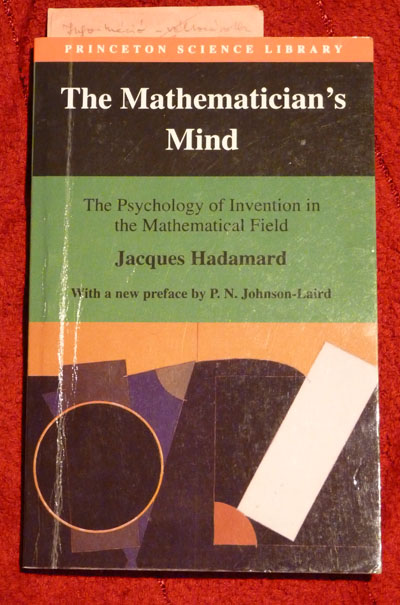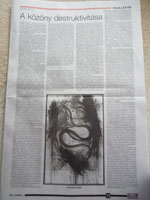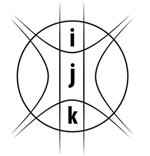Thinking of this and that IV
1. Gettier problem – belief and knowledge
I wanted to mention of the Gettier problem in my earlier writing about Luciano Floridi's book1.
…
One's approach of epistemology is that justified true belief is knowledge; ergo the knowledge is rooted in the belief. I think that relationship between belief and knowledge is more complicated2: a belief system does from summary of knowledge, and along these beliefs we will gain new experiences, i.e. additional knowledge comes from belief.
…
2. Life-affirmation
As regards the life, I'm insatiable: I want to live an endless variety of life at the same time - simultaneously - and infinitely long.
__________________________
1 Luciano Floridi – The Philosophy of Information
Thinking of this and that III
1. Cheap energy
...
2. Luciano Floridi – The Philosophy of Information
Content:
What is the Philosophy of Information?
Open Problems in the Philosophy of Information
The Method of Levels of Abstraction
Semantic Information and the Veridicality Thesis
Outline of a Theory of Strongly Semantic Information
The Symbol Grounding Problem
Action-Based Semantics
Semantic Information and the Correctness Theory of Truth
The Logical Unsolvability of the Gettier Problem
The Logic of Being Informed
Understanding Epistemic Relevance
Semantic Information and the Network Theory of Account
Consciousness, Agents and the Knowledge Game
Against Digital Ontology
A Defence of Informational Structural Realism
I was decisively influenced by the following opinion:
„Is the universe digital or analogue? Where does information stack up alongside time and energy as a constituent of the universe? There are some great questions to ask about the nature of information and Floridi tries his best to give some academic rigor to the subject. I tried hard, really I did. But I barely understood this book. Information is more than data with meaning. A lot more. And information is more than something that flows through a computer. For example, how does DNS replicate if not with information guiding its actions. While humans make great use information, we are clearly not the only manufacturers of information. Honey bees, for example, communicate and trade information. So clearly, information is bigger than just us and our smartphones.”1
_________________________________
1 Myles’s review:
http://www.goodreads.com/review/show/395019725
After registration, you may ask for a translation of the full text by email.
Poems which speak to me
Ákos Fodor, Élet és irodalom (meaning "Life and Literature" in Hungarian), 7 June 2013
1. First
The other one
…
2. Second
Xénia hommage à Goethe
…
3. Harmadik
Mini-ode
…
4. Negyedik
Account
There is only one ∞.
– It is just enough.
This is neither true nor far-sighted statement.
Thinking of this and that II
1. The Good, the Bad and the Artistic Representations
If an artistic representation reflects the reality therefore it will show both the good and the bad. Accordingly the arts propagate the bad. Because of this Shakespeare’s thought is true:
“… though music oft hath such a charm
To make bad good, and good provoke to harm.”1
2. Thoughts in connection with a new law: Information Security of the State and the Local Government Agencies - 2013th Annual L. law
…
3. Walls
All border walls with double nature: protects the delimited part from the external world, but imprisons it in one.
________________________________
1 Shakespeare, Measure for Measure, 4.1
Nonverbal communication, anticipation, intuition

In the title the three notions are often treated as the same, and each of them is classified as non-verbal communication. In my opinion this is not the correct approach, because the anticipation, but mostly the intuition1 is not only communication procedure but first of all it is a special way of information processing.
Thinking of this and that
1. About Time
The things are not "are", the things "happen".
2. The communication of bacteria, his colonies
Bacteria behave differently alone, and if there are many. According to researchers this behavior is promising because it will be easier to fight against the disease-causing germs.
…
3. Interference
…
Attila József, About the numbers
Poem, which will be the motto of my website
I chose one of poems of József Attila as my slogan. Title of this poem is “About the numbers”. Unfortunately I did not find its English translation1.
I tried to make a raw translation of the poem, but I can not translate the poem even in prose. My English knowledge is too poor to make even a simple translation.
Vlatko Vedral, Decoding Reality – the universe as quantum information
Book review1
I quote from the prologue of the book as an introduction:
„Within this discourse, surely the most exciting and fundamental question of all has to be: why is there a reality at all and where does it come from? In other words, before we can even speak about why things are connected, we need to ask ourselves why things exist in the first place. I will argue in this book that the notion of 'information' gives us the answer to both questions. Curiously, this makes information a far more fundamental quantity in the Universe than matter or energy, which is no mean feat in itself. If we look at reality in terms of 'bits of information', it is interesting that both the existence of reality and its inherent connectivity become completely transparent. Irrespective of whether you are a casual reader or a scientific researcher this has extraordinary implications for each and every one of us.
The three words that I read back in autumn 1994, which changed my perspective so markedly, were 'Information is physical'. The three words, in this order, stood out as the title of an amazing chapter in an otherwise obscure book, and over time made me realize that indeed maybe information is the answer. After having spent the last 15 years convincing myself that it is, I now endeavour to spend the next 12 chapters convincing you likewise.”
_____________________________________________
1 http://www.amazon.com/Decoding-Reality-Universe-Quantum-Information/dp/B005X4CLZ0
After registration, you may ask for a translation of the full text by email.
Deadly silence
 Thoughts about politics in reference to the essay of László Halász titled 'The destructiveness of silence"
Thoughts about politics in reference to the essay of László Halász titled 'The destructiveness of silence"
“May you live in interesting times.”
(Ancient Chinese curse1)
“Life is beautiful if it is hectic”
(Hungarian proverb)
It would be interesting to consider the background of the motto, his causes his motivations. Both are in some way related to the fact that I want to write. It is sure that we live interesting times, and undoubtedly it is better if we approach the complexity of hard times as beautiful thing.
Deus ex machina
The playwrights solved the totally hopeless situations by a divine intervention in the ancient Greek dramas; the expression quoted in the title was given to this dramatic turn.
There was a lot of criticism of these solutions of dramatists; I have now quoted from Aristotle only:
“In the characters too, exactly as in the structure of the incidents, [the poet] ought always to seek what is either necessary or probable, so that it is either necessary or probable that a person of such-and-such a sort say or do things of the same sort, and it is either necessary or probable that this [incident] happen after that one. It is obvious that the solutions of plots too should come about as a result of the plot itself, and not from a contrivance, as in the Medea and in the passage about sailing home in the Iliad. A contrivance must be used for matters outside the drama—either previous events which are beyond human knowledge, or later ones that need to be foretold or announced. For we grant that the gods can see everything. There should be nothing improbable in the incidents; otherwise, it should be outside the tragedy, e.g., that in Sophocles' Oedipus.”
Aristotle, Poetics (1454a33-1454b9)
I agree with Aristotle but I have several objections against the absolute lack of faith of the divine intervention. Likewise Aristotle did not want to drive the “Deus ex machine” out totally from the artworks, he wished only to put the things onto his right place as it is readable in the above citation.
After registration, you may ask for a translation of the full text by email.



